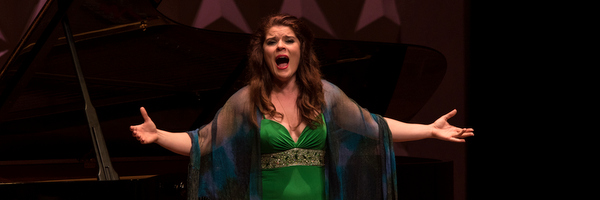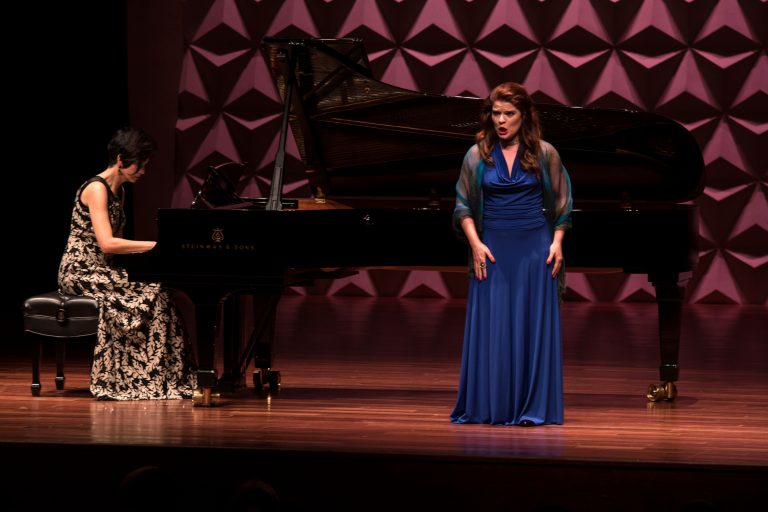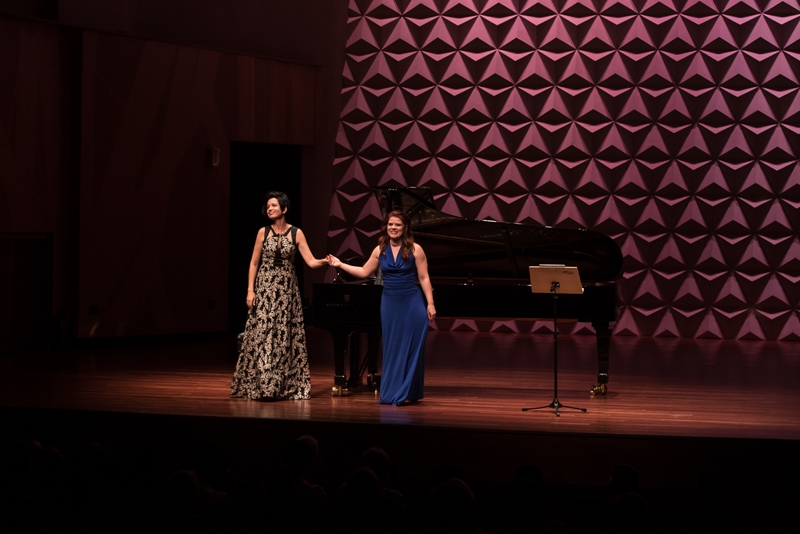With talented and audacius repertoire, soprano Tati Helene enchants Sala Cecília Meireles.
In pole vaulting competitions, athletes need to use the poles to jump over the bar without knocking it down. The bar is placed at a predetermined height by the judges, according to the rules and level of the competition. Each round, the bar is raised a little higher, increasing the level of difficulty, until a single athlete wins the competition.
There is also a curious and interesting expedient. At a given moment, usually when the competition reaches its decisive moment, one of the athletes may ask the judges to raise the bar further, and if he is able to jump perfectly at this new height that himself demands, he puts great psychological pressure on his opponents still in competition. This is exactly what the Brazilian Thiago Braz did to ensure the gold medal at the 2016 Olympic Games.

I remembered all this by watching Tati Helene‘s recital last Sunday, May 20, in the Lyrical series of the Sala Cecília Meireles in Rio de Janeiro. Accompanied by the pianist Priscila Bomfim, Helene raised the “bar”, especially in the second part of her presentation, and showed once again why she is one of the best Brazilian singers of her generation.
With a concert titled Woman and Power, the singer has performed songs from important female characters, whether in opera or in a cycle of songs, that exercise power in some way – power of government (like Queen Elisabetta, from Robert Devereux, or Princess Turandot, for example), ambition of power from Lady Macbeth, or even the power of the seduction from Shéhérazade.
And it was exactly with the three songs of the cycle Shéhérazade, from Maurice Ravel, on poems of Tristan Klingsor, that Tati Helene began her performance. The first of the songs, Asie, was already a beautiful business card, interpreted with great expressiveness. Only the high-pitched almost at the end of the play, may have sounded a little stronger than necessary. Then, with La flûte enchantée, the soprano remained always expressive, deserving featured the clarity of her french diction. L’indifférent completed Ravel’s cycle with correction.
Two arias completed the first part of the recital. In Divinités du Styx, from the opera Alceste by Gluck, the soprano demonstrated all the security of her technique, approaching the melodies with great musicianship. Already Il est doux, il est bon, Salomé’s aria in Jules Massenet’s opera Hérodiade, served to gather in one piece all the qualities exhibited by Helene until that moment.
And it was from there that the soprano raised the bar, with the second part of the program including pieces of diverse styles and with a high degree of difficulty. With talent and ability, as a voice athlete, Helene went well through the obstacles she placed in her path.
 It was a true tour de force, beginning with Vivi ingrato a lei d’accanto, from Donizetti’s Roberto Devereux, and following with nothing less than Casta Diva, from Bellini’s Norma. Soon after, the soprano attacked Vieni! T’affretta, preceded by the reading letter scene, that is sent to his wife by the title character of Verdi’s Macbeth and Io son l’umile ancella from Cilea’s Adriana Lecouvreur. All were approached with refined technique and excellent tuning and projection.
It was a true tour de force, beginning with Vivi ingrato a lei d’accanto, from Donizetti’s Roberto Devereux, and following with nothing less than Casta Diva, from Bellini’s Norma. Soon after, the soprano attacked Vieni! T’affretta, preceded by the reading letter scene, that is sent to his wife by the title character of Verdi’s Macbeth and Io son l’umile ancella from Cilea’s Adriana Lecouvreur. All were approached with refined technique and excellent tuning and projection.
Her lyric-spinto voice was agile or dense, according to the requirements of the pieces, with attention and care in the stretches that demanded precision in the legato, and although one could note in a few notes of passage a finish in which there could have been a a little more finishing, the whole was so well defended, with a sound so well carved, that the caveat ends up looking more annoying from a grumpy listener than anything else …
Of these four pieces, I emphasize Casta Diva, for the rare musical precision and expressive, and for being an interpretation of the famous aria that proved superior to those of the two sopranos that sang Norma last year in Belo Horizonte (staged) and in Rio de Janeiro (in concert form).
And yet there was perhaps the most challenging piece of the night, strategically guarded for the end of the program: In questa reggia, the terrible entrance of the ice princess in Puccini’s second act of Turandot. A passage from those capable of overthrowing or estabilish a singer. Tati Helene faced the challenge with bravery, with fairly sound in the low frequencies and impeccable high notes, in addition to a complete musicality. It was consecrated and was much applauded by the audience.
After all this weight, the bis reserved a light and tasty piece: Meine Lippen, sie küssen so heiß, from Lehár’s operetta Giuditta, which the artist sang with brilliance, grace and sensuality, closing a very special recital (one more!) on Sunday afternoon at the Sala Cecilia Meireles. Priscilla Bomfim accompanied Helene all night long with her delicate and musical hands, and with the rich expression peculiar to her, serving and giving proper support to the soprano.
For anyone who missed the recital, but is next weekend in São Paulo, Guarulhos or nearby, the tip is: Tati Helene is the star of a production of Verdi’s Macbeth opera, which will be presented at the Adamastor Theater in Guarulhos, on the 25th (Friday, at 8pm) and 27th (Sunday at 7pm) in May.
Doubtful choices
The Sala Cecilia Meireles, is not just now, usually has a more consistent season than the Municipal Theater of RJ. From 2017 until now, even the lyrical program, which should have been the stronghold of the Municipal, is more qualified in the Sala, kept in due proportion.
So it is impossible to understand the number of empty places at Lapa on the afternoon of last Sunday. Was singing there, just for comparison, an artist who was technically superior to the Italian half-mouth that the Municipal brought to sing in her production of Un Ballo in Maschera. Tickets prices were very affordable. And yet, not even young singers interested in observing and honoring a colleague of profession with a technique that should deserve attention and respect were not seen in the audience.
It seems that in Rio, the majority of listeners (and even most of the music connoisseurs …) really like to listen crap, and go to the opera or to recite more to do marketing, and less in search of quality. Losing those who did not go to the Sala.
Photos: Victor Jorge
by Leonardo Marques – movimento.com

